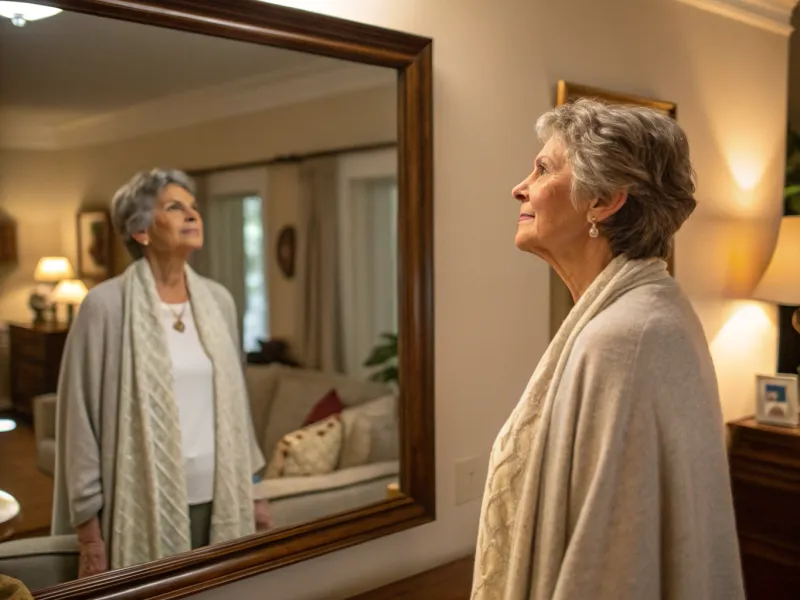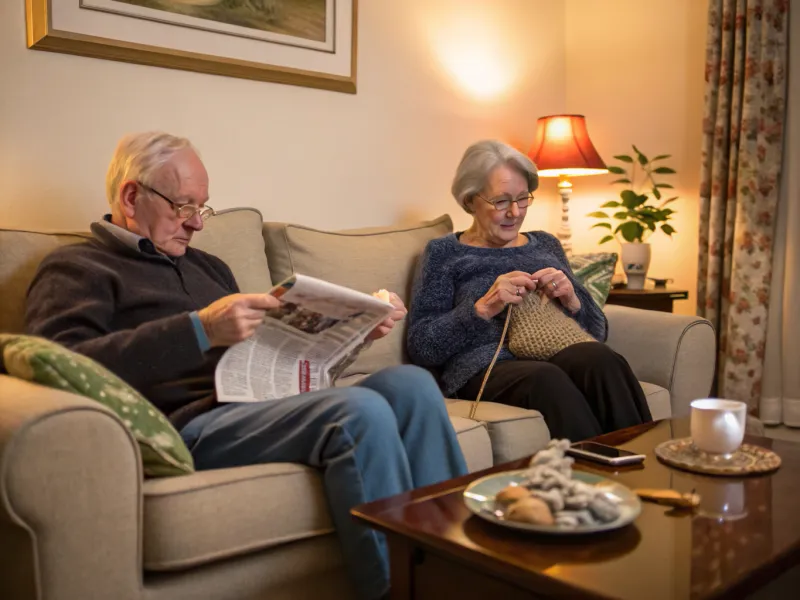27 Reasons Why Women Over 60 Walk Away From Long-Term Marriages
In a world where long-term marriages are often viewed as an unbreakable commitment, it’s both eye-opening and courageous when women over 60 decide to leave.
This isn’t about abandoning ship but reclaiming one’s life after years of feeling invisible or undervalued. You may have stayed because it seemed like the right thing to do or because you believed things would get better. But now, you’re considering a path that prioritizes your well-being and happiness.
Here are 30 reasons why women at this stage of life might choose to walk away, offering insights and perhaps a sense of solidarity for those contemplating the same choice.
1. Feeling Unheard and Overlooked

Years of feeling unheard can wear you down. It’s not just about the conversations where your voice wasn’t acknowledged; it’s about the emotional disconnect that slowly builds a wall between you and your partner. Imagine sitting at a dinner table night after night with no eye contact, no real exchange beyond the mundane.
You recall moments where you tried to express your thoughts, your worries, your dreams, only to be met with indifference or a change of subject. Over time, this pattern becomes a tapestry of neglect, weaving through the years until you begin to feel invisible. The silence grows louder than any argument, marking the absence of a true connection.
Choosing to walk away from such a relationship is not a step taken lightly. It’s a decision to seek a space where your voice echoes back, where your words matter. It’s an act of self-preservation, a defining moment when you decide that living in quiet desperation is no longer an option. You deserve to be seen and heard, and sometimes, that means stepping away.
2. Financial Betrayals

Financial betrayals cut deep and create an indelible breach of trust. Discovering hidden debts or secretive spending can shake the very foundation of a marriage. It’s not merely about the money, but the deception that accompanies it. When you’ve spent decades building a life together, the revelation of financial betrayal feels like a betrayal of the heart.
You ask yourself how many more secrets lie hidden beneath the surface, questioning the honesty of every financial decision made together. The security you thought you had evaporates, leaving a trail of doubt and resentment. You wonder if your partner truly understands the impact of their actions—not just on your bank account, but on your sense of partnership.
Walking away becomes a path to reclaiming your financial independence and peace of mind. It’s about taking control, ensuring that your future is not jeopardized by someone else’s choices. As daunting as it may seem, leaving behind the deceit allows you to pursue a life where transparency and trust are valued.
3. Emotional Neglect

Emotional neglect is like an invisible chain, binding you with no visible scars. It’s not dramatic or loud; it’s the quiet withdrawal of affection and attention that leaves a hollow in your heart. Over time, the lack of emotional support and understanding chips away at your self-worth.
You start questioning your own needs, wondering if your expectations are too high or if you’re asking for too much. But deep down, you know that everyone deserves love and attention, especially in a long-term relationship. The absence of emotional intimacy can be more hurtful than a physical absence.
Choosing to leave a marriage marred by emotional neglect is an act of self-care. It’s recognizing that you deserve a partner who meets your emotional needs and cherishes your presence. Stepping away allows you to rediscover your emotional strength and find spaces where you feel nurtured and valued.
4. Realization of Personal Growth

Personal growth can be a double-edged sword in a marriage, especially when one partner evolves while the other remains stagnant. You’ve grown in ways you never anticipated, uncovering passions and perspectives that your partner may not share or even understand.
This growth isn’t about leaving them behind but about recognizing that your journey might lead you down a different path. It becomes evident that clinging to a partnership that stifles your development isn’t conducive to your well-being.
Walking away allows you to embrace your evolution fully and seek connections that celebrate and support your newfound self. It’s about honoring your path and recognizing that sometimes, growth means parting ways to live authentically.
5. Infidelity

Infidelity cuts to the core, dismantling the trust and intimacy that took years to build. Discovering a partner’s unfaithfulness leaves you questioning your worth and the authenticity of your relationship. The emotional fallout is overwhelming, as the betrayal taints every shared memory and promise.
You grapple with feelings of inadequacy, anger, and sadness, wondering what you could have done differently. Yet, the fault lies not with you, but with the choices your partner made. The decision to walk away stems from a deep-seated need for respect and fidelity, to live a life where love is genuine and unconditional.
Leaving a marriage due to infidelity is not just about ending the relationship, but about reclaiming your dignity and emotional health. It’s a courageous step towards a future where trust is rebuilt, and true companionship is possible.
6. Loss of Shared Interests

Over the years, shared interests that once bonded you may slowly fade or shift. Perhaps you once enjoyed similar hobbies or had mutual goals, but now find yourselves drifting apart, engaged in separate worlds. The loss of common ground can feel isolating, as if living parallel lives under the same roof.
This divergence isn’t necessarily a failure but a natural evolution of two individuals growing separately. It becomes clear that maintaining a relationship without shared interests is challenging, leading to feelings of loneliness and disconnection.
Choosing to leave is about seeking companionship that aligns with your current self, pursuing activities and interests that fill your life with joy and meaning. It’s about finding someone who shares your enthusiasm and supports your pursuits, allowing you to thrive in a partnership that feels reciprocal and fulfilling.
7. Lack of Intimacy

Intimacy, both physical and emotional, is the lifeblood of a marriage. When it’s absent, you’re left with a profound sense of loneliness, even when physically close. The lack of intimacy isn’t just about the absence of touch but the erosion of a deeper connection that once existed.
You find that conversations become superficial, kisses rare, and moments of genuine connection almost nonexistent. The gap widens each day, turning your relationship into one of mere coexistence rather than partnership.
Walking away from such a marriage is a journey towards reclaiming that sense of connection—seeking relationships where intimacy is cherished and mutual. It’s about refusing to settle for a life devoid of closeness, choosing instead to pursue a future filled with warmth and understanding.
8. Unresolved Conflicts

Unresolved conflicts can fester over years, creating an undercurrent of resentment and tension. Every disagreement that is brushed aside or ignored adds another layer to the barrier between you. The accumulation of these unresolved issues eventually becomes too heavy to bear.
You may attempt to mend the rift with conversations, counseling, or compromises, but if these efforts are one-sided, the conflict remains. The realization that your partner is unwilling or unable to address the issues makes it difficult to envision a future together.
Deciding to leave is about choosing peace over perpetual conflict. It’s about recognizing that some battles aren’t meant to be fought indefinitely and that both partners deserve a chance to find happiness and resolution elsewhere. Walking away opens the door to finding harmony and contentment.
9. Physical or Emotional Abuse

Both physical and emotional abuse are profound violations of trust and safety within a marriage. The scars may be visible or hidden, but their impact is significant, affecting your self-esteem, sense of security, and overall well-being.
You may have endured the abuse out of fear, hope for change, or a belief that things might improve. But stepping back, you realize that love shouldn’t hurt—not physically, not emotionally. The decision to leave is about reclaiming your life and dignity, ensuring your safety and mental health are prioritized.
Choosing to walk away from an abusive marriage is an act of courage and self-preservation. It’s about breaking free from the cycle of abuse and seeking a life where love and respect are foundational. It means building a future where your worth is acknowledged and cherished.
10. Desire for Independence

The desire for independence can emerge strongly later in life, especially if you’ve spent years prioritizing others over yourself. This isn’t about rejecting companionship but embracing autonomy and self-discovery.
After decades of fulfilling roles and responsibilities, you find yourself yearning for freedom—to make choices based solely on what you want and need. It’s a chance to explore your identity beyond the confines of marriage, to rediscover passions, and pursue dreams that have been set aside.
Walking away is about embracing this independence, seeking a life where your aspirations take center stage. It’s an opportunity to create a future where your happiness and fulfillment are paramount, allowing you to live life on your own terms and find joy in being your own person.
11. Health Concerns Ignored

Health concerns that are dismissed or ignored by a partner can be deeply unsettling. When your physical or mental well-being is trivialized, it feels like a betrayal of the vow to care for each other in sickness and health. This neglect can lead to worsening conditions and a profound sense of isolation.
You may have tried to communicate the severity of your health issues, seeking understanding and support, only to be met with dismissal or indifference. This lack of empathy and action strains the relationship, making you feel more like a burden than a beloved partner.
Deciding to leave is a step towards ensuring that your health is a priority. It’s about surrounding yourself with people who value and respect your well-being, allowing you to heal and thrive in an environment where your health is genuinely cared for.
12. Changing Priorities

Life’s priorities can shift dramatically over the years. Where once stability and routine were cherished, now the call of adventure and personal fulfillment beckons. You find that your goals no longer align with those of your partner, who may resist change or prefer the status quo.
This divergence in priorities can lead to dissatisfaction and stifle personal growth. You yearn for experiences and opportunities that expand your horizon, while your partner remains anchored to familiar patterns. The gap between what you want and what you have grows wider.
Walking away is a choice to honor your evolving priorities, allowing you to pursue a life rich with experiences that resonate with your current values and desires. It’s about seeking a future that feels authentically yours, where you can freely chase the dreams and adventures that excite you.
13. Loss of Identity

Years spent in a marriage can sometimes lead to a loss of identity, as the roles you play—spouse, parent, caregiver—overshadow your individuality. It’s easy to lose sight of who you are in the midst of fulfilling others’ needs and expectations.
You may feel like a stranger to yourself, unsure of your own desires, interests, and passions. The realization that you no longer recognize who you are outside of your marriage is both startling and sobering.
Choosing to leave is about reclaiming your sense of self, rediscovering who you are beyond the roles you’ve inhabited. It’s an opportunity to explore your own identity, to embrace the person you’ve become and the person you still wish to be. Walking away allows you to embark on a journey of self-discovery and authenticity.
14. Unfulfilled Dreams

Unfulfilled dreams can linger like shadows, haunting the edges of a long-term marriage. These are the aspirations and goals you once held dear, perhaps set aside for practical reasons or to support your partner’s journey. Over time, the weight of these abandoned dreams becomes harder to ignore.
You find yourself yearning for the life you envisioned, questioning whether it’s too late to pursue the passions that once ignited your spirit. The realization that your marriage has become a barrier to these dreams is both painful and liberating.
Walking away is a step towards seizing the chance to fulfill your own dreams. It’s about choosing a path that allows you to explore and achieve the goals that still matter to you, even if it means embarking on this journey independently. You deserve to pursue a life where your dreams aren’t just memories, but realities.
15. Lack of Respect

Respect is a fundamental pillar of any healthy relationship, and its absence can erode the very foundation of a marriage. When your thoughts, feelings, and boundaries are consistently dismissed or belittled, it undermines your sense of self-worth and dignity.
You find yourself in situations where your opinions are disregarded, your contributions minimized, and your autonomy questioned. This lack of respect can manifest in subtle ways, gradually undermining your confidence and happiness.
Deciding to leave is about reclaiming your self-respect and seeking a relationship where mutual respect is a priority. It’s about finding an environment where your voice is valued, and your individuality is honored. Walking away allows you to pursue a future where respect is not just expected, but a given.
16. Different Life Goals

Life goals evolve, and sometimes, they no longer align with those of your partner. Whether it’s retirement plans, travel aspirations, or family commitments, finding yourself on a different path can create a rift in the relationship.
You may wish to spend your golden years exploring the world, while your partner prefers a quiet life at home. This difference in vision can lead to frustration and disappointment, as neither of you wants to compromise on what feels vital to your happiness.
Choosing to leave is about honoring your own life goals and finding a path that aligns with your desires. It’s an acknowledgment that sometimes, walking separate paths is necessary to achieve personal fulfillment and happiness. Leaving opens the door to pursuing the life you truly want.
17. Emotional Exhaustion

Emotional exhaustion creeps in slowly, born from years of unresolved tension, conflict, and unmet needs. It’s the weariness that settles into your bones, making even the smallest emotional effort feel overwhelming.
You find yourself constantly drained, with little energy to invest in a relationship that offers no replenishment. The emotional labor required to maintain the marriage outweighs any joy or satisfaction it provides, leaving you feeling depleted and unfulfilled.
Walking away is about seeking emotional rejuvenation and a partnership that nurtures your spirit. It’s choosing to prioritize your emotional health, seeking spaces where you can recharge and find solace. Sometimes, the decision to leave is a necessary step towards rediscovering joy and vitality.
18. Lack of Communication

Communication breakdowns can slowly erode the fabric of a marriage, leaving both partners feeling isolated and misunderstood. When conversations become rare or superficial, it’s hard to maintain a meaningful connection.
You may have tried initiating discussion, only to be met with silence or defensiveness. The topics that once brought you together now seem to cause division, as if every word is a potential trigger for conflict.
Choosing to leave a marriage devoid of communication is about seeking a relationship where dialogue flows freely and openly. It’s about finding a partner who values communication as a tool for connection and understanding. Walking away allows you to pursue a life where your voice is heard and valued, fostering a deeper sense of companionship.
19. Family Dynamics and Pressures

Family dynamics and external pressures can strain a marriage, especially when expectations and obligations become overwhelming. Whether it’s dealing with adult children’s issues, caregiving responsibilities, or extended family conflicts, these pressures can take a toll on your relationship.
You find yourself constantly caught in the middle, trying to balance your marriage with familial obligations. The stress can become all-consuming, leaving little room for the relationship itself to thrive.
Deciding to leave is about creating boundaries and prioritizing your own well-being. It’s about seeking a life where family dynamics don’t dictate your every move, allowing you to focus on your own happiness and the relationships that genuinely support you. Walking away opens the door to a future where you can engage with family on your terms.
20. Lack of Emotional Support

Emotional support is crucial in any marriage, providing the strength and comfort needed to navigate life’s challenges. When the support is absent, it feels like standing alone in a storm, without shelter or reassurance.
You may have reached out time and again, seeking encouragement and understanding, only to be met with indifference or criticism. This lack of emotional backing leaves you feeling isolated, questioning the very essence of your partnership.
Choosing to leave is about seeking a relationship where emotional support is mutual and abundant. It’s about finding a partner who stands by you, offering empathy and strength. Walking away allows you to pursue a future where emotional safety and support are integral to the relationship, fostering a sense of true partnership and companionship.
21. Different Social Circles

When social circles diverge, they can create a divide that’s difficult to bridge. The friends and social activities that once brought you together now feel like separate worlds, leading to feelings of exclusion or loneliness.
You may find that your partner’s social life no longer includes you or that your friends have grown distant due to differing interests or schedules. This separation can exacerbate feelings of isolation, as if you’re living parallel lives.
Choosing to leave is about finding companionship that complements your social needs. It’s about seeking relationships where social connections are shared and fulfilling, aligning with your lifestyle and interests. Walking away allows you to pursue a life where your social circles are inclusive and supportive, enriching your personal and social well-being.
22. Stifled Creativity

Creativity is a vital expression of self, and when it’s stifled in a marriage, it can feel like part of your soul is being suffocated. Whether it’s painting, writing, or any other form of creative pursuit, not having the space or support to express yourself can be deeply frustrating.
You may have tried to carve out time for your creative passions, only to find them dismissed as trivial or unimportant by your partner. This lack of encouragement can dampen your creative spirit, leaving you feeling unfulfilled and stifled.
Choosing to leave is about reclaiming your creative space and freedom. It’s about pursuing a life where your passions are nurtured and celebrated, allowing you to express yourself fully and joyfully. Walking away opens the door to a future where creativity is a fundamental part of your existence, not a sidelined hobby.
23. Nostalgia for Past Love

Nostalgia can be a powerful force, especially when it comes to past loves that once brought joy and fulfillment. As time goes on, you may find yourself longing for the connection and passion of a previous relationship, comparing it to the present void.
This yearning isn’t about living in the past but acknowledging what your current marriage lacks. The memories of past happiness highlight the emotional gaps and unmet needs that have become too significant to ignore.
Walking away is about seeking a relationship that rekindles that sense of deep connection and satisfaction. It’s about honoring your memories while pursuing a future that promises new, meaningful relationships. Leaving allows you to embrace a life where love isn’t just a memory but a present and future reality.
24. Fear of Dying Unfulfilled

As the years pass, the fear of dying unfulfilled can become increasingly pronounced. You reflect on your life, assessing whether your current path aligns with your true desires and aspirations. The realization that your marriage may be a barrier to fulfillment is both daunting and motivating.
You weigh the years ahead, considering the legacy you wish to leave and the life you want to live. The prospect of reaching the end of your life without having truly lived spurs you to action.
Choosing to leave is about embracing the opportunity to create a life that feels complete and meaningful. It’s about pursuing the experiences, relationships, and accomplishments that matter most to you. Walking away allows you to take control of your narrative, ensuring that your final chapters are rich with fulfillment and joy.
25. Incompatibility

Incompatibility isn’t always apparent at the beginning of a marriage, but over time, differences in values, interests, and lifestyles can become more pronounced. Living with someone whose worldview doesn’t align with yours can lead to constant friction and dissatisfaction.
You may have tried to bridge these differences, seeking compromise and common ground, but the gaps remain. The energy spent trying to make things work becomes exhausting, overshadowing any positive aspects of the relationship.
Walking away is about acknowledging these irreconcilable differences and seeking a partnership that feels more aligned. It’s an acceptance that compatibility is crucial for a harmonious relationship, and sometimes, parting ways is the most loving choice for both partners. Leaving allows you to pursue a future where compatibility is not a struggle, but a natural part of your relationship.
26. Seeking Happiness

Happiness is a fundamental pursuit, and realizing that your marriage no longer contributes to your joy is a powerful motivation to leave. Over the years, you may have compromised your happiness for the sake of stability or obligation, but the desire for joy becomes undeniable.
You reflect on what truly makes you happy and recognize that the current relationship is more draining than uplifting. The pursuit of happiness becomes a guiding principle, a call to action that can no longer be ignored.
Walking away is about choosing happiness as a priority, seeking a life where joy is abundant and genuine. It’s about embracing the possibilities of new beginnings, where your well-being is at the forefront. Leaving allows you to pursue a path that aligns with your innermost desires, ensuring that happiness is not just a fleeting moment, but a lasting state of being.
27. Refusal to Settle Anymore

The refusal to settle anymore becomes a powerful catalyst for change. After years of compromising your desires and needs, you reach a breaking point. The realization that life is too short to live unfulfilled ignites a desire for transformation.
You examine your marriage and recognize the ways in which you’ve settled, whether it’s in love, respect, or personal growth. The decision to leave is about embracing a life where you no longer accept less than what you deserve.
Choosing to walk away is an act of empowerment, a commitment to living authentically and fully. It’s about pursuing a future where settling is not an option, where every choice aligns with your true self and aspirations. Leaving allows you to reclaim your life, ensuring that the years ahead are rich with fulfillment and joy.







